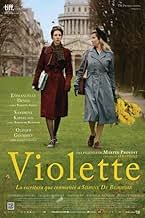अपनी भाषा में प्लॉट जोड़ेंViolette Leduc, born a bastard at the beginning of last century, meets Simone de Beauvoir in the years after the war in St-Germain-des-Prés. Then begins an intense relationship between the t... सभी पढ़ेंViolette Leduc, born a bastard at the beginning of last century, meets Simone de Beauvoir in the years after the war in St-Germain-des-Prés. Then begins an intense relationship between the two women that will last throughout their lives, a relationship based on the quest for free... सभी पढ़ेंViolette Leduc, born a bastard at the beginning of last century, meets Simone de Beauvoir in the years after the war in St-Germain-des-Prés. Then begins an intense relationship between the two women that will last throughout their lives, a relationship based on the quest for freedom through writing for Violette and conviction for Simone to have in their hands the fate... सभी पढ़ें
- निर्देशक
- लेखक
- स्टार
- पुरस्कार
- 1 जीत और कुल 1 नामांकन
फ़ीचर्ड समीक्षाएं
The second thing is that both Kiberlain and Devos are outstanding. Devos takes this role of Violette and makes it completely human. She is a dozen conflicted people and all the time in need of many things but most of all, in need of love. As de Beauvoir, Kiberlain is magisterial. She has de Beauvoir's haughtiness, her brilliance, her perfect sense of her own destiny.
The relationship between the women of such different circumstances is told with grace and balance and insight.
The photography and choice of locales is good too. The sense of place is considered, from the cold farm in winter, through to freezing Paris and then the Midi in summer at the end. Some shots may linger, because it can look so good on the screen, but that remark apart there is little to fault here.
Recommended for all its best virtues.
Maybe one default of this film and others of the genre is that sometimes dialogues are just too good, too literary and cerebral, too much of "for eternity". Specially Simone's, always bright, never trivial. Violette, on the contrary, is much more real, even when she repeats the same idea, moans, quarrels, just suffers or, occasionally, laughs, her character is much more 'alive' and believable.
Simone is like a therapist to poor V., her "life advice" is always right, even if it could be said that she also says it to get rid of V.
Photography is superb, specially Paris buildings and the female character's faces. Only perhaps marred by the "postcard images" of rural France. Music is also enthralling, particularly Avro Part's minimalism, obsessive as Violette. Maybe the score being so repetitive helps us focus on her life, that although seems full of episodes or chapters, they all end up in unrequited love. V. strives for recognition, some money to live and "not being alone", and gets probably only the first two. She repeats "Thins will always be the same", a trademark of depressive thought.
Psychologically, Violette was the poster child of a perpetual victim, always asking for things her partners cannot or will not give, yet she is also manipulative as with Jacques Guérin and also with Simone d B.
Simone treats V. with aloofness yet sometimes looks genuinely friendly with Violette, specially near the end. Yet, Simone speaks disparaging of Violette on at least one occasion, to Jacques: "Violette cannot be friends with anybody, I do it -taking care of her- out of duty".
The script is full of contradictions like the aforementioned or how Violette rebounds from her bouts of depression, or the relationship with her mother - another great actress, totally believable even with an erratic plot-. But great films like this are not made to be analyzed, but enjoyed.
Much as I am a fan of Emanuelle D., I feel she cannot play a woman that was famous for being ugly. Even the way she moves in the beginning at least, she is too much of a "rather nice woman" to play Violette. Sandrine, on the contrary, LOOKS like Simone d B. so much that, like with all good compositions –Kidman's Virginia Woolf on 'the Hours' comes to my mind- we will have the problem after having watched her performance of "always having the mental image of their performance when thinking about the author". Which is in a way, good proof that their acting is truer than life –Kiberlain and Kidman's-.
Martin Provost directed the famous 'Séraphine' but I feel this film is so much better, or at least, so much closer to my heart. Maybe because even if both films deal with artistic genius and rather stubborn woman, both women also with some sort of mental malady, Séraphine seems to struggle in emptiness, whereas Violette has something concrete to fight against, be it the literary establishment that doesn't recognize her, censorship, her long string of bad lovers, her lack of love for herself, her poverty and insecurities. Violette struggles against something, is perpetually in motion, until she cracks.
Séraphine is in a world inhabited by one person only: herself. Violette deals with the country as well as the city, another difference with Séraphine –country only-.
My favourite character is probably Jean Genet's, a lovable gifted rascal with his husky voice and love of life. Unlike Woody Allen's film 'Midnight in Paris', this film enables us to "live through" the characters's perspective, with all their defaults and contradictions. I wouldn't have thought that there was such misery in Paris or that Violette would live in such shabby apartments. They all look brown, dirty and depressing. As I said décor and wardrobe are just incredible, you wonder how did they come along such wonderful dresses. Sometimes I just looked at Violette and SdB.'s clothing, and I know nothing about fashion. I agree with IMDb reviewer ferdinand1932 about the well crafter structure in layers of the script.
This is a film not to be missed if you like French films, Paris and the literary world. A tad long perhaps but beautiful as you will rarely see.
When the film opens, Violette (played by Emmanuelle Devos) is running from the police. We assume that she's wanted by the Gestapo, but, in fact, she is just caught hiding some black-market food, for which she spends a few days in prison.
Eventually, after the war, LeDuc goes to Paris, where she is befriended by Simone de Beauvoir (played by Sandrine Kiberlain). LeDuc is introduced to de Beauvoir's circle-- Sartre, Camus, Genet. LeDuc began to write--mainly semi-autobiographic novels--that attained some popularity, despite being heavily censored. The censorship was due to the lesbian content, as well as the graphic sexuality. (Tame subjects now, but not in post-war France.)
I didn't enjoy this movie much. Violette, as portrayed in the film, wasn't really a fascinating character. The movie ran for over two hours, with too many scenes of discussions in publishers' offices. I thought the best component of the film was Kiberlain's portrayal of Simone de Beauvoir. Her Beauvoir was beautiful in a non-traditional way, and very forceful and direct. Despite the title of the movie, the screen didn't light up when LeDuc was portrayed. For me, Beauvoir was the character who was truly at the center of the movie.
We saw this film at the Little Theatre, as part of ImageOut, the admirable Rochester LGBT Film Festival. It will work well on DVD.
Emmanuelle Devos impressed me very much with her tenacity in bad times and her masochistic devotion to Beauvoir. Sandrine Kiberlain, reed-thin and erect of bearing, looked and sounded very much like Beauvoir. Olivier Py as the sleazy Sachs stole all his scenes.
क्या आपको पता है
- साउंडट्रैकFratres for strings and percussion
Composed by Arvo Pärt
Performed by Tapiola Sinfonietta, Jean-Jacques Kantorow
टॉप पसंद
- How long is Violette?Alexa द्वारा संचालित
विवरण
- रिलीज़ की तारीख़
- कंट्री ऑफ़ ओरिजिन
- आधिकारिक साइट
- भाषा
- इस रूप में भी जाना जाता है
- 盛開紫羅蘭:西蒙波娃與薇奧麗賴朵絲
- उत्पादन कंपनियां
- IMDbPro पर और कंपनी क्रेडिट देखें
बॉक्स ऑफ़िस
- दुनिया भर में सकल
- $14,93,822
- चलने की अवधि2 घंटे 19 मिनट
- रंग
- ध्वनि मिश्रण
इस पेज में योगदान दें






























